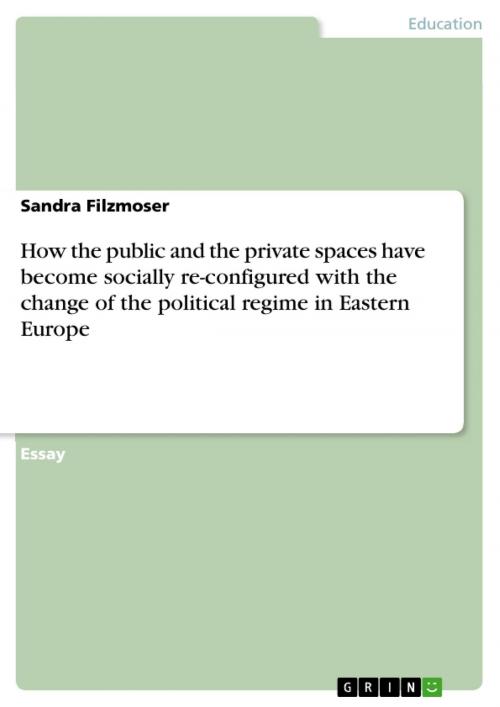How the public and the private spaces have become socially re-configured with the change of the political regime in Eastern Europe
Nonfiction, Reference & Language, Education & Teaching| Author: | Sandra Filzmoser | ISBN: | 9783656292609 |
| Publisher: | GRIN Publishing | Publication: | October 18, 2012 |
| Imprint: | GRIN Publishing | Language: | English |
| Author: | Sandra Filzmoser |
| ISBN: | 9783656292609 |
| Publisher: | GRIN Publishing |
| Publication: | October 18, 2012 |
| Imprint: | GRIN Publishing |
| Language: | English |
Essay from the year 2011 in the subject Pedagogy - Science, Theory, Anthropology, grade: 1, University of Bologna (MIREES - International Research and Studies on Eastern Europe), course: Anthropology of Eastern Europe, language: English, abstract: Milan Kundera dedicates one chapter of his fist novel on how much the policy of the communist regime connected the private sphere with the public one. His example of a village chapel shows how the communists connect the fate of the party with the one of the entire chapel. The policy was to 'melt' private and public life. Thus cultural associations and activities were generously supported and as time passes political reserves disappeared. The amalgamation was done. The party had access and interfered in every single facet of life. Due to that, the new setting after the fall showed changes in life of the people to which I will dedicate this essay. The fall of communism altered the political and the economic system. The paradigm was changed reciprocally with it and caused confusion in the value system as in material assets. Hence, people had to redefine their identities. Birgit Müller connects the altered values with politics through the involvement of emotions and explains the difficulty of the new democratic system. The structural change didn't easily find implication on the local level. Müller describes that '[p]olitical power was still seen as a total force, not as the result of a communicative act.' This phenomenon resulted in her example of a village in a Czech Village in personal attacks in public. 'The public space was ... not the forum for an engaged exchange of ideas and opinions.'
Essay from the year 2011 in the subject Pedagogy - Science, Theory, Anthropology, grade: 1, University of Bologna (MIREES - International Research and Studies on Eastern Europe), course: Anthropology of Eastern Europe, language: English, abstract: Milan Kundera dedicates one chapter of his fist novel on how much the policy of the communist regime connected the private sphere with the public one. His example of a village chapel shows how the communists connect the fate of the party with the one of the entire chapel. The policy was to 'melt' private and public life. Thus cultural associations and activities were generously supported and as time passes political reserves disappeared. The amalgamation was done. The party had access and interfered in every single facet of life. Due to that, the new setting after the fall showed changes in life of the people to which I will dedicate this essay. The fall of communism altered the political and the economic system. The paradigm was changed reciprocally with it and caused confusion in the value system as in material assets. Hence, people had to redefine their identities. Birgit Müller connects the altered values with politics through the involvement of emotions and explains the difficulty of the new democratic system. The structural change didn't easily find implication on the local level. Müller describes that '[p]olitical power was still seen as a total force, not as the result of a communicative act.' This phenomenon resulted in her example of a village in a Czech Village in personal attacks in public. 'The public space was ... not the forum for an engaged exchange of ideas and opinions.'















